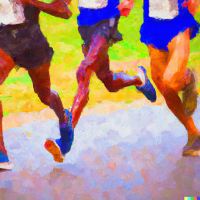Running Pace and Different Distances
by John
(Williamstown, MA USA)

I'd like to be able to show her that her pace is improving each week -- and am wondering if there is a way to adjust pace over distances.
That is, I'd like to normalize all of her times from different-length races so we can compare them.
I understand this may not be how "real" runners think about it, but any feedback would be greatly appreciated. Thanks in advance.
Answer by Dominique:
Hi there,
Thanks for your question about your daughter's cross country running.
My response:
1. Normalizing race distances
2. Improving performance every week? Young people in sport
Normalizing Race Distances

It allows you to work out what the equivalent time is on a different distance given a time in a distance you ran, e.g. you can work out that a 1:25 half marathon is roughly equivalent to a sub-3 hr marathon.
It is actually exactly how "real runners" think. Well, at least, I do use it all the time. When I have got a 'big race' coming up I usually run a tune-up race a few weeks before, so I know what type of shape I am in and how fast I should be expecting to go on the big day.
It is very useful to have an understanding of equivalent performances. It can help prevent you from going out at a pace that is too high or too low. It can also serve as a bit of a reality check.
Improving Performance Every Week? Young People in Sport

Some weeks you feel strong and you do really well. Some weeks you do not.
Some weeks the course may involve more hills, more mud, more difficulty than other weeks.
Some circumstances may suit some runners; some circumstances may suit others.
Especially in cross-country, you can have some discrepancy in course lengths as well. Sometimes they advertise a course as being 5k long and it is 5.2k or 4.8k. Hard to compare course to course.
In running, I think it is helpful to think about process goals and performance goals.
Process goals are basically the goals we set for ourselves in the training we do, e.g. the number of training sessions per week, the mileage we cover, etc.
Performance goals are the results in competitions and the race times we get.
In a sport like running it is much better to focus on process goals. Making sure we put the work in. Day after day. Week after week. Month after month. Eventually, that will lead to improvements in performance.
Performance in races may be more erratic. So, praise your daughter for the work she puts in every week. Praise her for every race finished. Almost every race will have a positive moment that can be cherished. But avoid getting too obsessed about race times. Especially when people race every week, they'll hit good days and bad days and performance will not always be linear.
It's fine to be a bit competitive. And get young children familiar with the concepts of competition, winning and losing, and improving themselves. The most important thing is that they do these competitions with positivity. That they enjoy what they do and that it builds their confidence, such that it sets them up for a healthy, happy life.
Enjoy the upcoming cross-country season!
Hope this helps.
Kind regards,
Dominique


